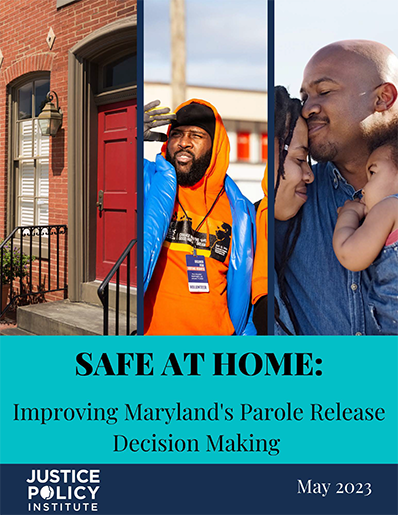 The Maryland Parole Commission (MPC) suffers from a series of systemic problems that result in the parole system’s inability to conduct its duties effectively. Safe at Home assesses how well parole practices in Maryland are aligned with other states, identifies inefficiencies in release decision-making, and provides options for changes to policy and practice informed by best practices in the field.
The Maryland Parole Commission (MPC) suffers from a series of systemic problems that result in the parole system’s inability to conduct its duties effectively. Safe at Home assesses how well parole practices in Maryland are aligned with other states, identifies inefficiencies in release decision-making, and provides options for changes to policy and practice informed by best practices in the field.
JPI conducted a comprehensive analysis of national parole practices and identified several policy options grounded in best practices in parole decision-making and supervision. JPI identified these policies by conducting interviews with system and field experts, attorneys, community members, and those with lived experience. These policy options are a mere blueprint that can help guide legislative and administrative actions better align the MPC with best practices across the country. Maryland decision-makers must now solicit input from a broad range of stakeholders, including community members, to operationalize these options into policy.
- The MPC should adopt a structured decision-making tool that incorporates a validated needs assessment tool.
- The MPC should operate under the presumption that the goals of punishment have been met at the time of initial parole eligibility. Parole release decision-making should be based solely on objective factors related to an individual’s future risk to public safety.
- Supervision should be imposed selectively, with the length and conditions of supervision linked to risk. Conditions should be the least restrictive necessary to meet the goals of reentry and public safety. Resources should be frontloaded, and people should have the opportunity to shorten their parole term through good behavior.
- The MPC should work closely with other criminal justice agencies and support agencies to develop a parole release plan that supports a successful reentry.
- The MPC should employ transparency in parole release decision-making protocol and practices. The applicant and victim should be fully informed of the process and be allowed to participate actively.
- Reasons for denial of parole must be made public, documented in writing, and appealable.
- An applicant should have access to counsel and be provided all materials that the MPC will use to make its decision in advance of a hearing.
- Establish standards for parole board member eligibility, including education and work/life experience.
- The parole board must have transparent rules and procedures that reflect the input of all interested parties.
- The parole board should adopt a robust set of performance measures that are publicly reported regularly.
JPI works with state leaders and community stakeholders to advance comprehensive policy options for consideration by the Maryland General Assembly, the Maryland Parole Commission, and other state decision-makers. Our work in Maryland is part of our broader efforts, in places like the District of Columbia, to draw attention to the harms of mass incarceration and long prison terms and support evidence-based reforms that provide options to earn release and safely return home.